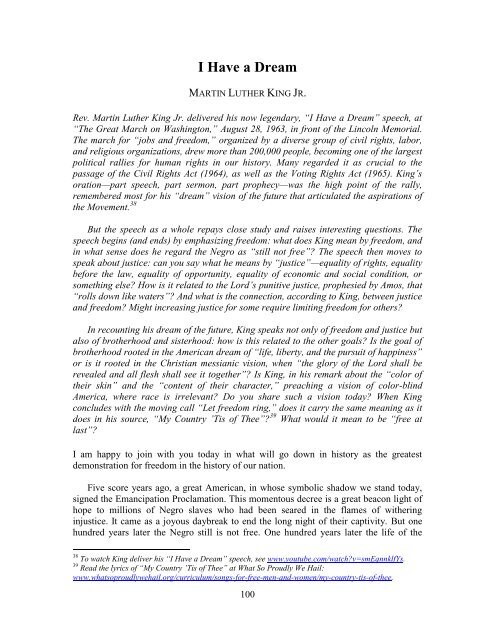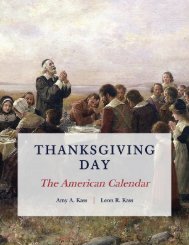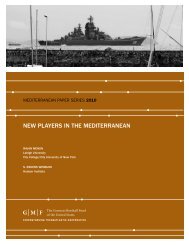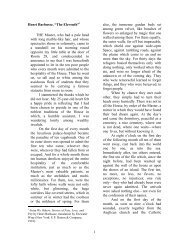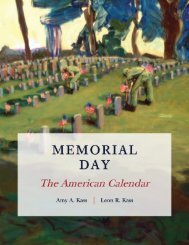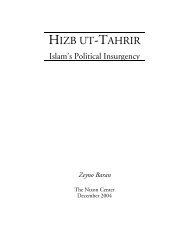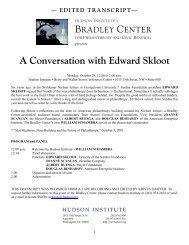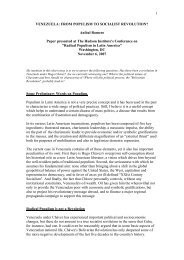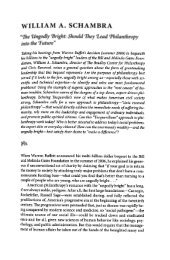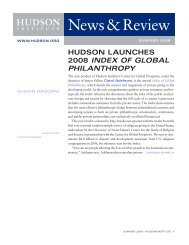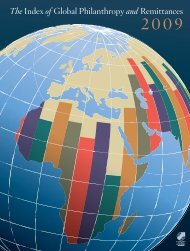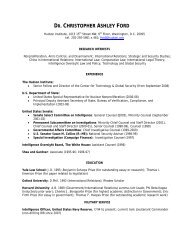Download PDF - Hudson Institute
Download PDF - Hudson Institute
Download PDF - Hudson Institute
You also want an ePaper? Increase the reach of your titles
YUMPU automatically turns print PDFs into web optimized ePapers that Google loves.
I Have a Dream<br />
MARTIN LUTHER KING JR.<br />
Rev. Martin Luther King Jr. delivered his now legendary, “I Have a Dream” speech, at<br />
“The Great March on Washington,” August 28, 1963, in front of the Lincoln Memorial.<br />
The march for “jobs and freedom,” organized by a diverse group of civil rights, labor,<br />
and religious organizations, drew more than 200,000 people, becoming one of the largest<br />
political rallies for human rights in our history. Many regarded it as crucial to the<br />
passage of the Civil Rights Act (1964), as well as the Voting Rights Act (1965). King’s<br />
oration—part speech, part sermon, part prophecy—was the high point of the rally,<br />
remembered most for his “dream” vision of the future that articulated the aspirations of<br />
the Movement. 38<br />
But the speech as a whole repays close study and raises interesting questions. The<br />
speech begins (and ends) by emphasizing freedom: what does King mean by freedom, and<br />
in what sense does he regard the Negro as “still not free”? The speech then moves to<br />
speak about justice: can you say what he means by “justice”—equality of rights, equality<br />
before the law, equality of opportunity, equality of economic and social condition, or<br />
something else? How is it related to the Lord’s punitive justice, prophesied by Amos, that<br />
“rolls down like waters”? And what is the connection, according to King, between justice<br />
and freedom? Might increasing justice for some require limiting freedom for others?<br />
In recounting his dream of the future, King speaks not only of freedom and justice but<br />
also of brotherhood and sisterhood: how is this related to the other goals? Is the goal of<br />
brotherhood rooted in the American dream of “life, liberty, and the pursuit of happiness”<br />
or is it rooted in the Christian messianic vision, when “the glory of the Lord shall be<br />
revealed and all flesh shall see it together”? Is King, in his remark about the “color of<br />
their skin” and the “content of their character,” preaching a vision of color-blind<br />
America, where race is irrelevant? Do you share such a vision today? When King<br />
concludes with the moving call “Let freedom ring,” does it carry the same meaning as it<br />
does in his source, “My Country ’Tis of Thee”? 39 What would it mean to be “free at<br />
last”?<br />
I am happy to join with you today in what will go down in history as the greatest<br />
demonstration for freedom in the history of our nation.<br />
Five score years ago, a great American, in whose symbolic shadow we stand today,<br />
signed the Emancipation Proclamation. This momentous decree is a great beacon light of<br />
hope to millions of Negro slaves who had been seared in the flames of withering<br />
injustice. It came as a joyous daybreak to end the long night of their captivity. But one<br />
hundred years later the Negro still is not free. One hundred years later the life of the<br />
38 To watch King deliver his “I Have a Dream” speech, see www.youtube.com/watch?v=smEqnnklfYs.<br />
39 Read the lyrics of “My Country ’Tis of Thee” at What So Proudly We Hail:<br />
www.whatsoproudlywehail.org/curriculum/songs-for-free-men-and-women/my-country-tis-of-thee.<br />
100


